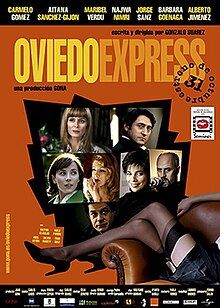Oviedo Express
| Oviedo Express | |
|---|---|
 Theatrical release poster | |
| Directed by | Gonzalo Suárez |
| Written by | Gonzalo Suárez |
| Produced by | Juan Gona |
| Starring |
|
| Cinematography | Carlos Suárez |
| Edited by | Celia Cervero |
| Music by | Carles Cases |
Production company | Gona Cine y Televisión |
| Distributed by | Universal Pictures |
Release date |
|
| Country | Spain |
| Language | Spanish |
Oviedo Express is a 2007 Spanish comedy-drama film directed and written by Gonzalo Suárez. It stars Carmelo Gómez, Aitana Sánchez-Gijón, Maribel Verdú, Najwa Nimri, Jorge Sanz, Bárbara Goenaga and Alberto Jiménez.
Plot
[edit]The plot was reportedly inspired on Stefan Zweig's Fear, although barely anything of the work (the nexus with the intrigue if at all) is identifiable in the film.[1][2] A troupe of thespians moves to Oviedo to stage a play based on La Regenta. Mariola Mayo is the leading actress performing the stage role of La Regenta/Ana Ozores.[3] The Mayor of Oviedo has an affair with journalist Bárbara Ruiz.[4][5] Emma (a nod to Madame Bovary's character), the scorned spouse of the Mayor of Oviedo and a young scholar preparing a PhD dissertation on La Regenta, portrays a sort of Regenta-like in-fiction character.[5] Emma has sexual intercourse with Benjamín Olmo, the leading actor of the play.[6][1]
Cast
[edit]- Carmelo Gómez as Benjamín Olmo[7]
- Aitana Sánchez-Gijón as Mariola Mayo[8]
- Maribel Verdú as Mina[5]
- Najwa Nimri as Bárbara Ruiz[5]
- Jorge Sanz as Álvaro Mesía[5]
- Bárbara Goenaga as Emma[5]
- Alberto Jiménez as Ernesto de Villamarín,[5] the Mayor
- Silvia Marty[9]
- Víctor Clavijo[9]
- Carmen Ruiz-Tilve[10]
Production
[edit]The project was originally titled Érase una vez Oviedo.[10] The film was shot in Oviedo in 2006.[10]
Release
[edit]The film was theatrically released in Spain on 31 October 2007.[11]
Reception
[edit]Alberto Bermejo of El Mundo rated the film 4 out of 5 stars, writing that "above many other things, 'Oviedo Express' is very funny, even though it is much more than a comedy", with additional superimposed layers of farce, vaudeville, melodrama, and caricature, also featuring a cast of actors taking risks "in unusual registers" delivering the elaborated and "highly personal" dialogues of Gonzalo Suárez.[12]
Jonathan Holland of Variety deemed the film to be "a typically eccentric dramedy" and (so much) "over-the-top", featuring a "bunch of fine Spanish actors overacting for all they're worth".[4]
Accolades
[edit]| Year | Award | Category | Nominee(s) | Result | Ref. |
|---|---|---|---|---|---|
| 2008 | 22nd Goya Awards | Best Original Screenplay | Gonzalo Suárez | Nominated | [13] |
| Best New Actress | Bárbara Goenaga | Nominated | |||
| Best Production Supervision | Teresa Cepeda | Nominated | |||
| Best Cinematography | Carlos Suárez | Nominated | |||
| Best Original Score | Carles Cases | Nominated | |||
| Best Art Direction | Wolfang Burmann | Nominated | |||
| Best Makeup and Hairstyles | Lourdes Briones, Fermín Galán | Nominated | |||
| 17th Actors and Actresses Union Awards | Best Film Actor in a Secondary Role | Jorge Sanz | Nominated | [14][15] |
See also
[edit]References
[edit]- ^ a b Melloni, Alessandra. "La Regenta: circuitos intersemióticos" (PDF). p. 37 – via Centro Virtual Cervantes.
- ^ Pérez, Marta (28 October 2017). "El director se venga de «La Regenta» con el personaje de Aitana Sánchez-Gijón". La Nueva España.
- ^ Nogueira Soto 2018, p. 304.
- ^ a b Holland, Jonathan (3 December 2007). "Oviedo Express". Variety.
- ^ a b c d e f g Nogueira Soto 2018, p. 305.
- ^ Nogueira Soto 2018, p. 310.
- ^ Nogueira Soto 2018, p. 308.
- ^ Nogueira Soto 2018, p. 311.
- ^ a b "La película Oviedo Express, seleccionada para el Festival Español de Cine de Nantes". 20minutos.es. 28 February 2008.
- ^ a b c Neira, Susana (1 August 2016). "El rodaje de 'Oviedo Express' en una «ciudad de cine»". El Comercio.
- ^ "«Oviedo Express» arrasa en grandes ciudades". La Nueva España. 8 November 2007.
- ^ Bermejo, Alberto (6 November 2007). "Fabular y actuar o viceversa". Metrópoli – via El Mundo.
- ^ "Oviedo Express". premiosgoya.com. Academia de las Artes y las Ciencias Cinematográficas de España. Retrieved 12 June 2022.
- ^ "'Las 13 rosas' y las series TVE, favoritas en los premios de la Unión de Actores". 20minutos.es (in Spanish). 18 January 2008. Retrieved 16 November 2021.
- ^ "La saga Bardem triunfa en los premios de la Unión de Actores". El Mundo (in Spanish). 1 April 2008. Retrieved 16 November 2021.
Bibliography
[edit]- Nogueira Otero, Xosé (2018). "Oviedo Express, de Gonzalo Suárez: el género degenerado (una vez más)". Quintana (17). Santiago de Compostela: Universidade de Santiago de Compostela. doi:10.15304/qui.17.5181.
External links
[edit]- Oviedo Express at ICAA's Catálogo de Cinespañol
